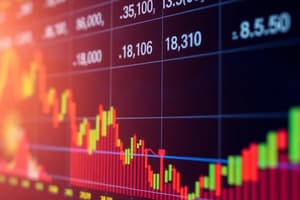Podcast
Questions and Answers
What is the primary purpose of margin in derivatives trading?
What is the primary purpose of margin in derivatives trading?
To represent market fluctuations, reflecting the loss or gain made on that day.
How do arbitrageurs make money in the market?
How do arbitrageurs make money in the market?
By buying low-priced stocks and selling them at higher prices in a different market, exploiting market imperfections.
What is the main advantage of using derivatives in an investment portfolio?
What is the main advantage of using derivatives in an investment portfolio?
It gives investors an arbitrage advantage, allowing them to buy an asset at a low price and sell it at a higher price in another market.
What is the primary purpose of buying derivatives in a portfolio?
What is the primary purpose of buying derivatives in a portfolio?
What is the key difference between options and futures contracts?
What is the key difference between options and futures contracts?
How do forward contracts differ from futures contracts?
How do forward contracts differ from futures contracts?
What is the primary benefit of using derivatives to manage risk?
What is the primary benefit of using derivatives to manage risk?
What is the main reason investors prefer derivatives over other investment instruments?
What is the main reason investors prefer derivatives over other investment instruments?
What is the primary purpose of hedgers in the derivatives market?
What is the primary purpose of hedgers in the derivatives market?
What is the characteristic of a derivative that requires little initial net investment?
What is the characteristic of a derivative that requires little initial net investment?
What do derivatives derive their value from?
What do derivatives derive their value from?
What is the main difference between hedgers and speculators in the derivatives market?
What is the main difference between hedgers and speculators in the derivatives market?
What are some common examples of underlying assets used in derivatives?
What are some common examples of underlying assets used in derivatives?
What is the primary goal of speculators in the derivatives market?
What is the primary goal of speculators in the derivatives market?
What is the characteristic of a derivative that is settled at a future date?
What is the characteristic of a derivative that is settled at a future date?
Why do hedgers invest in derivative markets?
Why do hedgers invest in derivative markets?
Flashcards are hidden until you start studying
Study Notes
Derivatives: Meaning, Features, and Importance
- Derivatives are financial instruments that derive their value from some other security or index, such as bonds, stocks, commodities, currencies, and indices.
- They are complex financial instruments used for various purposes, including hedging and accessing additional assets or markets.
Characteristics of Derivatives
- A derivative is a financial instrument whose value changes in response to changes in a specified interest rate, security price, commodity price, foreign exchange rate, index of prices or rates, credit rating or credit index, or similar variable.
- Derivatives require no initial net investment or little net investment relative to other types of contracts.
- They are settled at a future date.
Participants of the Derivatives Market
- Hedgers: risk-averse brokers and traders who invest in derivatives to protect their portfolio from market risk and price fluctuations.
- Speculators: risk-takers who invest in derivatives to earn large profits, with a mindset opposite to hedgers.
- Margin Traders: investors who pay a margin to participate in derivatives trading, which reflects market fluctuations.
- Arbitrageurs: investors who make use of market imperfections to buy low-priced stocks and sell them at higher prices in different markets.
How Derivatives Work
- Investors buy derivatives to reduce portfolio volatility, agreeing on a price for a deal in the present that will happen in the future.
- Derivatives enable investors to gain exposure to a market with a smaller outlay than buying the actual underlying.
Why Invest in Derivative Contracts?
- Derivatives offer an Arbitrage advantage, allowing investors to buy an asset at a low price and sell it at a higher price in another market.
- Derivatives protect investors from market volatility and help shield their assets against market downturns.
- Derivatives are a great way to transfer risk and balance out a portfolio.
Typical Examples of Derivatives
- Options: contracts giving the right, but not the obligation, to buy or sell an asset at a specified price before a specified date.
- Swaps: agreements to exchange cash flows or other financial instruments over a set period.
- Futures: standardized contracts to buy or sell an asset at a future date and price.
- Forward Contracts: custom agreements to buy or sell an asset at a future date and price.
Studying That Suits You
Use AI to generate personalized quizzes and flashcards to suit your learning preferences.



